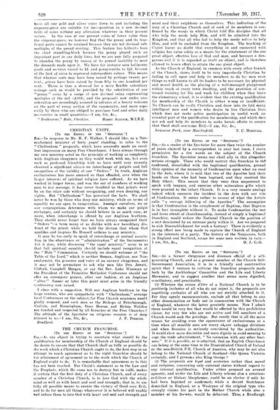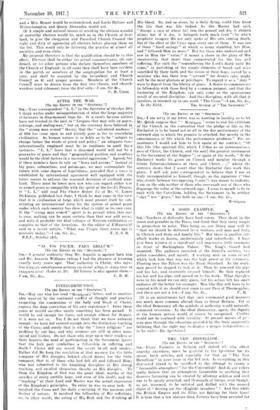(To run EDITOR or THE " SPECTATOR.")
Sas,—As a former clergyman and diocesan official of a self- governing Church, and as a present member of the Church Self- Government Association, it is in a friendly and constructive spirit that I venture to criticize the franchise proposals made both by the Archbishops Committee and the Life and Liberty Movement, and to suggest another that seems more dignified, conciliatory, and practicable.
(1) Whereas the mason 4Petre of a National Church is to be positively inelesire of all who do not reject it, the proposals are negatively exclusive of all who are not strictly attached to it. For they openly excommunicate, exclude all that belong to any. other denomination or body not in communion with the Church of England, whatever the latter precisely means. Now I admit there would be very few that would be affected by this prohibitive clause, for very few who are not active and full members of a Church would seek the privilege. But surely that is all the more reason for aroiding even the appearance of exclusiveness at a time when all sensible men are weary of,5our unhappy divisions and when Reunion is seriously considered by the authorities. It would show more discretion and more dignity to avoid seeming to copy the trade advertisement, " No connexion with any other busi- ness." If it is possible, as is admitted, that an English Churchman can belong at the some time to the Disestablished Church of Ireland or the non-British P.E. Church of America, why may he not also belong to the National Church of Scotland—like Queen Victoria certainly, and I presume also King George ?
• (2) The proposals are legal and sectarian rather •than moral and religious, concerning only external status without regard to any internal cinalifieetion. Under either proposal an avowed agnostic, and tinder the Life and Liberty scheme also a notorious mil-liver or blatant blasphemer, could be an elector if only he had been baptized or confirmed; while a devout Scotchman domiciled in England, or a Wesleyan of the original type who strongly claims his part in the Mother Church while also a member of his Society. -would be debarred. Thus, a Bradlaugh
and a Mrs. Besant would be enfranchised, and Lords Balfour and Wolverhampton and Queen Alexandra would not.
(3) A simple and natural means of avoiding the obvious scandal of unworthy electors would be, much as in the Church of Scot- land, to give the clergyman and Parochial Church Council the right and duty of approving all electors before plating them on the list. This would only be following the practice of almost all societies, and even clubs.
My proposal therefore is that the qualification should be to this effect. Electors shall be either (a) actual communicants, (1.0 con- firmed, or (c) other persons who declare themselves members of the Church of England; in all eases they shall bare been resident in the parish or members of the congregation for at least a year, and shall he accepted by the incumbent and Church Council as fit and proper persona. Members of the Church Counen must be drawn front the first two classes, and church- wardens (and sidemen) from the first only.—I am, Sir dr., C. H. Coins.



































 Previous page
Previous page